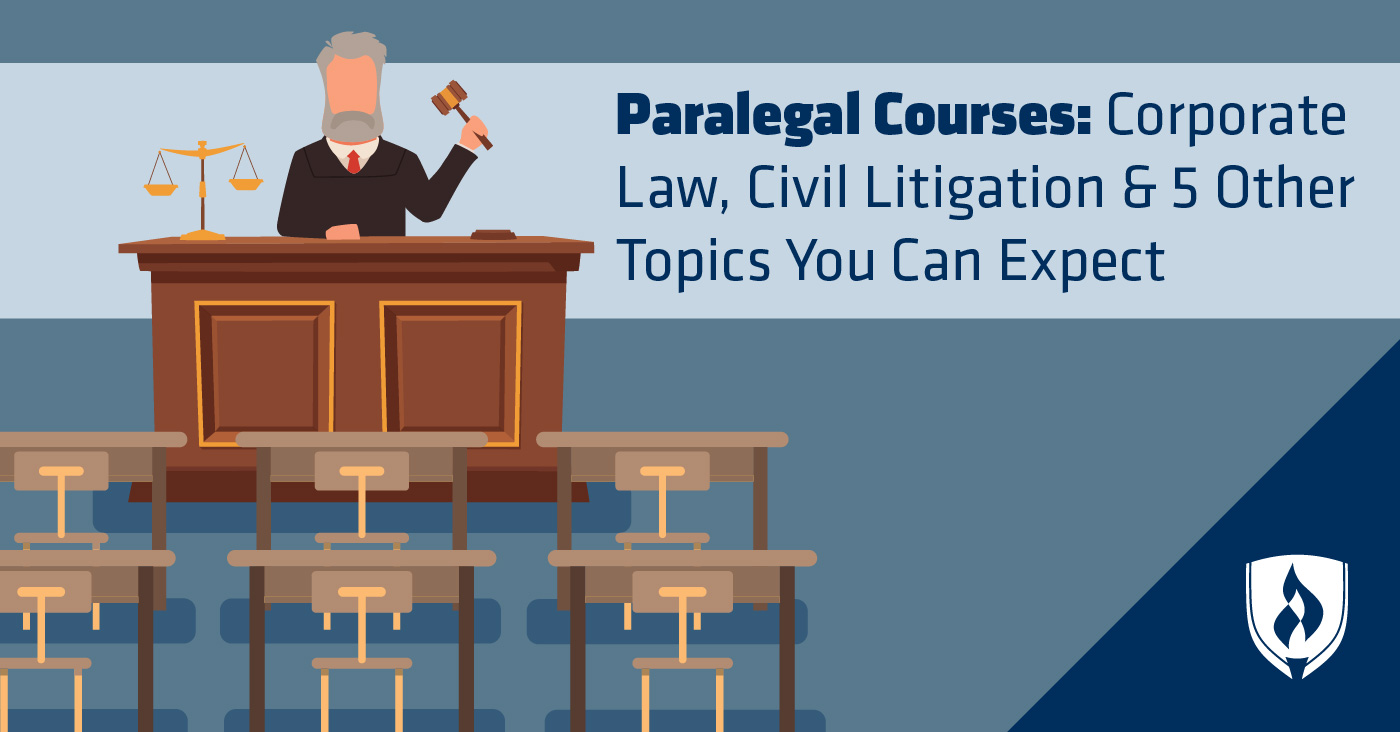Paralegal Courses: Criminal Law, Civil Litigation & 5 Other Topics You Can Expect
By Jess Scherman on 07/08/2019
After enough time spent on a less-than-thrilling career path that leaves you feeling unchallenged and perhaps even lacking in motivation, you’re ready to explore something that’s always fascinated you: the legal field.

You may have decided that the far-reaching goal of becoming a lawyer isn’t in the cards for you, but there’s another way you can turn your captivation with court cases and legal proceedings into an intriguing career opportunity. As a paralegal, you’d have the opportunity to assist lawyers with their daily proceedings, doing everything from gathering evidence and conducting research to speaking with witnesses and summarizing transcripts.
There are many different types of paralegal specialties you could pursue, but most paralegal programs offer students courses on a handful of topics considered cornerstones for the career. In addition to courses on topics like legal writing, legal research and basic computer applications, a typical student can expect some of the following seven paralegal courses. Also check out what types of attorneys you might assist as a paralegal.
7 Paralegal classes you might take when you earn your degree
If you’re considering enrolling in a paralegal program, you’re probably curious about what to expect. Keep reading to get a sneak peek at some common paralegal courses.
1. Criminal law & procedure
Criminal law is the body of law that relates specifically to crime. In a criminal law and procedure course, students will learn all about the types of crimes they may encounter in their work as a paralegal.
Topics covered in a criminal law and procedure course include the varying classifications of crimes, different theories of punishment and the range of rules and procedures within the pretrial process. They’ll also learn about the different stages of the criminal process and the factors that go into criminal sentencing.
2. Legal ethics
As a paralegal, you may encounter ethical issues that may arise within the practice of law. A legal ethics course provides students with an in-depth analysis of attorney and paralegal ethical codes, empowering future paralegals to learn to recognize ethical conflicts and research answers to ethical dilemmas.
Topics covered in a legal ethics course include the Unlicensed Practice of Law (UPL), confidentiality, privilege, conflicts of interest and professional conduct. Students learn not only how to apply ethical rules and guidelines to specific situations but also to identify which issues can be handled independently and which must be done by or under the supervision of an attorney.
3. Civil litigation
While criminal law refers to the proceedings related specifically to crime, civil litigation describes the legal process as it’s applied to noncriminal matters. As the process of resolving a legal dispute between two or more parties, civil litigation can involve conflicts related to family law disputes, court custody cases, child support payments, breaches of contract, disputes between a landlord and tenants, and more.
In a civil litigation course, students will learn about the paralegal’s role through each stage of a civil case —from the first point of contact with a client through each stage of litigation. Topics covered include initiating a lawsuit, the discovery stage of a lawsuit, legal motions and the various documents needed to prepare for a trial. After taking a course on civil litigation, paralegal students will know how to construct pleadings, interview clients and prepare discovery, trial and post-trial documents.
4. Family law
Family law is a branch of civil litigation that focuses on issues involving family relationships. A family law course examines the substantive law and ethical considerations of domestic litigation. Topics covered include child custody, child support, divorce and spousal support.
Paralegal students in a course on family law will learn more about researching and analyzing specific family legal issues, with a focus on practical aspects such as discovery, court procedures, preparation of commonly filed pleadings and other documents used in family law.
5. Corporate law
Corporations are considered legal entities created under state law, and as such, corporate law encompasses all of the legal issues that corporations face. In order to enjoy the tax and other benefits they receive, corporations are subject to numerous regulations. Corporations can also face a litany of legal issues related to things like employment law, contract disputes, product liability, intellectual property management and more.
A corporate law course introduces paralegal students to the various types of business entities, including how they are created, how they operate and how they can be terminated. Students also study ethical dilemmas faced by businesses, the responsibility a business has to its customers and a business’s responsibility for the actions of its employees and agents. There may also be a focus on the examination of intellectual property along with the important aspects of the immigration and naturalization process.
6. Property & estate planning
Property and estate law refer to the legal regulations and proceedings that surround all of a person’s physical possessions. Property is all of the things, objects or land an individual has dominion or right of use over. Estate consists of all property owned by an individual at the time of his or her death.
A paralegal course on property and estate planning provides students with the basic concepts of the laws of property and probate. Students will learn to apply laws and ethics to drafting real estate, probate and estate planning documents.
7. Law office management
While courses on criminal law, estate planning and legal ethics may seem more critical to the paralegal profession on the surface, the importance of law office management cannot be understated. A law office management course will help paralegal students gain a valued understanding of how law offices operate.
Students will learn about everything from file management and law office billing to professional communication and software commonly used in the legal environment. Interestingly, prospective paralegals will also have an opportunity to learn about the role social media can play in a law office.
Learn more about the paralegal profession today
If you’ve spent time daydreaming about workdays filled with researching real-life legal cases, gathering evidence for a team of attorneys or helping draft important documents in preparation for an upcoming trial, it may be time to take the leap and dedicate yourself to a fulfilling career change. As a paralegal, the detailed work you’ll perform on a daily basis could have the potential to make or break cases for your law firm.
And if you’ve been toying with the thought of becoming a paralegal for a while, you should know that now is the time to break into the industry. In fact, the Bureau of Labor Statistics reports a projected 15 percent increase in paralegal jobs by 2026—that’s more than double the growth expected of all occupations nationwide.1
If you’re ready to start making your new career dreams a reality, head over to the Rasmussen College Paralegal degree page to learn about your options.
1Bureau of Labor Statistics, U.S. Department of Labor, Occupational Outlook Handbook, [accessed May 2019] www.bls.gov/ooh/. Information represents national, averaged data for the occupations listed and includes workers at all levels of education and experience. Employment conditions in your area may vary.




